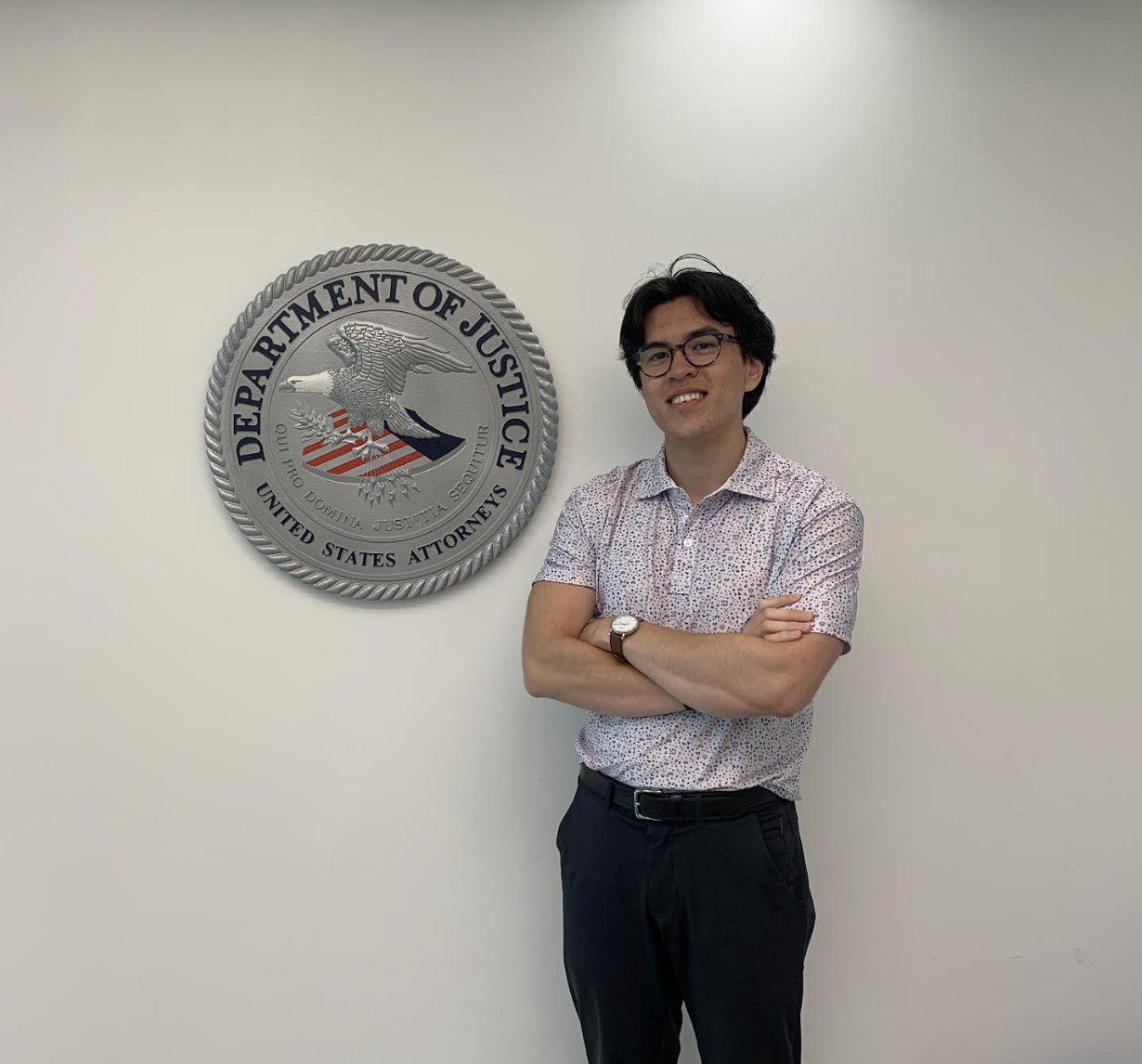Thoughts on Theses: Tim Carroll ’25
Tim Carroll ’25 is a senior majoring in Law, Jurisprudence, and Social Thought. His thesis explores the intersection of philosophy, law, and politics as it relates to animal rights.

Q: Tim, I’m really excited to talk about your thesis. Could you first tell me a little bit about yourself before we get started?
A: Yes! I’m a senior LJST major, and I’m originally from Princeton, New Jersey. A few things I have been a part of at Amherst are ACEMS, the e-Board of Amherst weightlifting club, and ultimate frisbee. I also helped found Amherst Veggie Club for students interested in plant-based living, which I’m still involved with now.
Q: How fun. So, getting into your thesis, what is it on and why did you decide to pursue one?
A: My thesis is on animal law. Ever since high school, I have been interested in the intersection between philosophy, politics, and law. Debate was the defining thing [I did] in high school. Particularly this one format of debate called Lincoln-Douglas debate, which is a philosophical analysis of policy proposals. That framework and way of thinking about the world inspired me and made me interested in LJST, which I ended up majoring in. In high school, I also became really interested in animal ethics and animal philosophy. In an ethics class, I was assigned “Animal Liberation” by Peter Singer, which is the most famous animal ethics treatise of our era. Even though my thesis disagrees very strongly with him in certain ways, he first got me interested in animal ethics, which developed alongside my interest in animal philosophy and law. Then, everything came to a head in my junior year when I was abroad [at Oxford] and had a tutorial on the philosophy of animal and environmental law … I knew I wanted to write a thesis because it’s a great challenge and a culmination of your entire time at Amherst so it felt appropriate to do it on animal law. Then, one summer I read about this case, the Happy the Elephant case … This case involved an Asian elephant named Happy in the Bronx Zoo, [living] in a one-acre exhibit, which is extremely tiny for an elephant. In this case, [I thought that] the Nonhuman Rights Project argued that Happy was a legal person. At least that’s how I read it at the time, even though their argument was slightly different. And so that was really interesting to me, like the intersection between philosophy and politics and animal philosophy and law, where everything came together with this case of Happy. And I was like, ‘It’s just so interesting that we’re asking ourselves, is an elephant a person?’ Or, ‘What would it mean to consider an elephant to be a person, even though obviously an elephant isn’t a person?’ … At its core, my thesis is about [Martha] Nussbaum, a philosopher who has a framework called the Capabilities Approach, which is a more capacious way of thinking about rights. My thesis looks at the Capabilities Approach and the idea of what it truly means for a creature to flourish, on its own terms. [It is different] than a creature just having rights or experiencing pleasure or pain. It seriously considers, what does it mean to flourish and how can that idea of flourishing be transformative to animal law?
Q: Wow! That’s extremely fascinating. I know theses are often niche, but that’s really niche!
A: Yeah definitely it is. Very niche! But I think that’s also what’s exciting about it. You know, on one hand, it’s challenging and disheartening, because the law is a conservative thing and doesn’t like to change very much over time. But on the other hand, [over the past few] decades since the [19]60s, the animal compassion movement has kicked up, and so it's coming out in law very slowly. So yeah it is really niche, but it’s also exciting!
Q: Yes, totally! What do you hope the ultimate impact of your thesis will be?
A: Well, you know, my ultimate goal is to become an animal rights lawyer. I’m extremely passionate about the rights of animals. I think this thesis is a great occasion for me to develop a strong framework for myself to use and think about as I consider what I want to pursue in my career. I also hope to make an original scholarly contribution. I mean obviously, it would have to be an outstanding undergrad[uate] thesis to do that but I’m hoping to at the very least, slot my work into a turn in animal law: moving away from rights and welfare to the idea of animal flourishing. So I hope to be a part of that. In terms of impacting lives tangibly, I hope downstream that I can effect change for animals all over the world. That’s, at the end of the day, what it’s really all about.
Q: That’s really inspiring. Now I know you said you just recently started the writing process but have there been any obstacles you have faced throughout the process either to do with the thesis or even just balancing writing a thesis with your social life and extracurriculars?
A: Well writing a thesis in general is very hard because you’re trying to make an original scholarly contribution when there are people whose entire job is to think about this. We’re students trying to put ourselves on the playing field with academics who have been in the game for decades. It’s like, good luck trying to come up with a well-researched, well-argued, well-executed contribution to the field, right? That’s just extremely difficult. So it takes a lot of creativity and a lot of labor. Writing a thesis is the ultimate test of, can you do it all? Can you research? Can you argue it well? Can you manage your time well?
Q: How do you carve out working on your thesis on the day-to-day?
A: Yeah, this is funny; a lot of my friends give me shit for this. I’m extremely meticulous with scheduling my time — my days, my weeks, my months, and even the shape of my year. And on the one hand, [some of my friends say] “Wow, that's going to kill the spontaneity in your life. You’re going to be a robot.” On the other hand, if you want to live your life according to a certain set of values or if you want to carve out time, for example, to read poetry, you actually should plan and stick to that plan to live your life how you want to live it. And so that’s the kind of philosophical idea behind it. For that [mindset] I’m very indebted to self-help and productivity [books].
Q: That is an impressive amount of discipline!
A: Yeah, I mean it’s kind of funny. Like, I’ll pull up my calendar and my friends will look over and be like, “Oh my God you’re crazy!”
Q: Who do you think has supported you the most throughout this process?
A: I will sing my praises to [John E. Kirkpatrick 1951 Professor in Law, Jurisprudence and Social Thought Adam] Sitze. I am very blessed to be working with him. He’s been really generous with his time and energy. We first met over the summer and talked through my thesis, and since then, he’s been an incredible thought partner to have. I also think, in a sense, all of my past educators have helped me. My high school ethics teacher helped me with this thesis by just getting me interested in animal philosophy and by assigning Peter Singer. Then there was my summer research project about critical animal studies with [Associate Professor of Spanish and English] Sony Corañez Bolton who was gracious enough to let me take it and run in my own direction, which proved to be very formative … Otherwise, honestly, anybody who’s ever been interested [in my thesis], anybody who’s ever gone to Veggie Club, or anyone who has asked me about animals has [helped me] with my thesis. I’ve just been thinking about animals for so long, and anybody who I’ve been able to think about animals with has helped me with this thesis.
Q: Is there any wisdom you would share with someone who is looking to write a thesis or considering writing a thesis?
A: Maybe three things. I mean there’s the obvious thing of writing what you care about which will take care of most of the issues [someone] would have about investing time into [your thesis]. You totally shouldn’t just pick something because you think it would be a good thesis, or because it’s what XYZ people in your department want to see you write. Because then, you won’t put a lot of serious energy into it and you won’t have genuine passion for it. The second would be kind of related: think about why you’re doing it. And I think this is related to what I said earlier but for me, I really am trying to think about this thesis as an occasion for me to think through what kind of animal, lawyer, and philosopher I want to be in the future, which is something that matters a lot to me … And the third falls under the theme of being disciplined. [A thesis] is the ultimate test of your collegiate ability and you just have to be super deliberate about how you approach it. So be systematic in your own way; even if you prefer being chaotic, be chaotic in the way that works for you … and hopefully not too chaotic!
Q: That’s great advice! You briefly touched on this, but do you have any post-grad plans lined up, and if so, does this thesis apply to what you plan to do immediately after graduating?
A: Right now I’m interested in teaching at an independent school or a private high school directly after graduating. I went to a boarding school and that was a really fantastic experience and super formative in many ways. I would love to provide that to similarly situated students … Plus, from the people I’ve talked to, it’s a great transition out of undergrad. I’ve also been interested in the possibility of a master’s in philosophy if I [can] get funding, though that’s extremely hard, so we’ll see. Then, of course, it’s my intention to become an animal rights lawyer and activist and hopefully do some really great work there. In terms of how my thesis might apply, I mean, it’s funny, Professor Sitze has actually suggested that I send my thesis, once it’s complete, to the Nonhuman Rights Project … like I could just email it to them. They’ll probably open it and maybe they’ll give some internal read to it and find it to be interesting or maybe they won’t listen to some undergrad and I’ll have to wait until I’m in law school. But yeah, that is one sense in which it might have a very tangible impact in terms of what it could help the Nonhuman Rights Project argue in the next case, and obviously that directly impacts animals in zoos who are suffering.
Q: You sound super busy; what do you like to do for fun?
A: For fun, I’ve recently been trying to get into poetry. I just think it's something I’ve really wanted to do for a while. I think it’s kind of amazing that when you read a great poem, and have this experience with it, in many ways, it’s indescribable. In other parts of my life, I’m always breaking things down into understandable arguments, but there’s something non-optimizable about poetry, which I find really interesting. So I’ve been trying to get into that recently. But, you know, time is hard to come by!
Q: That would be so cool; hopefully they do read it. Lastly, is there anything else you would like to add?
A: I would like to just cheekily plug the advice that I’ve given in my column [with Joe Sweeney ’25] in The Student which is that I think everybody, especially in college, should be reflective about what they want to do in college and life and should make the time to think about how they’re going to achieve that. It’s something I didn’t do for a very long time … We’re in such a privileged position to be at this institution [where] you can just spend your time thinking, reflecting, and studying, so figure out what you want to do and then really pursue it. Seriously, no matter what it is, it would be so cool if everyone at Amherst thought about what they’re passionate about, and then really pursued it instead of just being indifferent. Even people with whom I disagree with politically, I would be happy if they fervently pursued the projects that I disagree with. That would be more exciting and inspiring.
Q: That’s really great advice, Tim. Thanks so much for taking the time to talk about your thesis today.
A: Thank you!





Comments ()